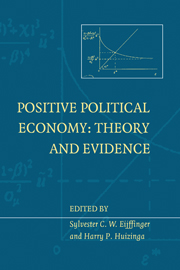Book contents
- Frontmatter
- Contents
- List of figures
- List of tables
- List of contributors
- Foreword
- Introduction
- I Monetary institutions and policy
- II Exchange rate policy and redistribution
- 7 Exchange rate anchors and inflation: a political economy approach
- 8 Why capital controls? Theory and evidence
- 9 The political economy of the Exchange Rate Mechanism
- 10 Unemployment benefits and redistributive taxation in the presence of labor quality externalities
- Index
10 - Unemployment benefits and redistributive taxation in the presence of labor quality externalities
from II - Exchange rate policy and redistribution
Published online by Cambridge University Press: 05 September 2013
- Frontmatter
- Contents
- List of figures
- List of tables
- List of contributors
- Foreword
- Introduction
- I Monetary institutions and policy
- II Exchange rate policy and redistribution
- 7 Exchange rate anchors and inflation: a political economy approach
- 8 Why capital controls? Theory and evidence
- 9 The political economy of the Exchange Rate Mechanism
- 10 Unemployment benefits and redistributive taxation in the presence of labor quality externalities
- Index
Summary
Introduction
Unemployment benefit schemes have been explained by Bailey (1978) and Fleming (1978) as insurance against the risk of job loss. Boadway and Oswald (1983) and Wright (1986) have considered the political economy aspects of such insurance. Zeckhauser (1971) and Cooter and Helpman (1974), among others, alternatively rationalize transfer payments to the non-working poor as acts of altruism. This contribution offers a third rationale for unemployment benefits stemming from the fact that exits by relatively unproductive workers from the work force may in fact increase the productivity of remaining workers. This is the case if there are peer group effects in the work place in the sense that a worker's productivity depends on the quality of his co-workers as well as on his own quality. Henderson, Mieszkowski, and Sauvageau (1978) and Arnott and Rowse (1987) argue that such peer groups are important in the classroom setting, and they suggest that peer group effects may equally be important in the work place. Along similar lines, Sala-i-Martin (1992) introduces labor productivity externalities to explain mandatory retirement of older workers in a growth context.
Huizinga (1994) considers tax and transfer policy in a model of labor quality externalities for the case where the tax authorities have two fiscal instruments: (i) lump sum unemployment benefits, and (ii) proportional labor income taxes. This chapter extends Huizinga (1994) by introducing a third fiscal instrument: a lump sum tax (or transfer) to all workers regardless of their employment status.
- Type
- Chapter
- Information
- Positive Political EconomyTheory and Evidence, pp. 269 - 289Publisher: Cambridge University PressPrint publication year: 1998



